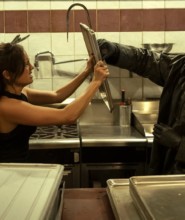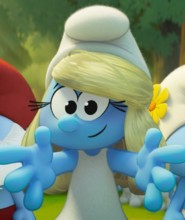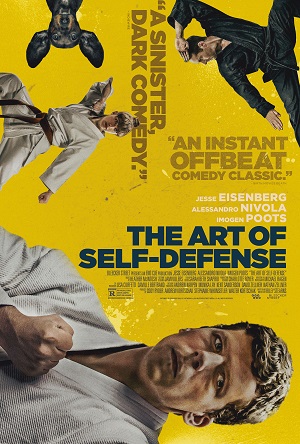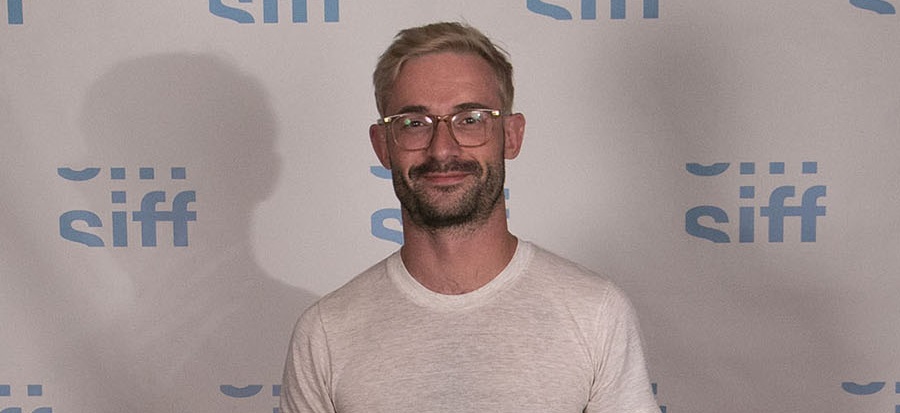
“The Art of Self-Defense” – Interview with Riley Stearns
by Sara Michelle Fetters - July 18th, 2019 - Film Festivals Interviews
a SIFF 2019 interview
Dissecting Masculinity
Writer/Director Riley Stearns chats about his festival favorite The Art of Self-Defense
The thing about writer/director Riley Stearns’ festival favorite The Art of Self-Defense is how unapologetically upfront it is about subverting as many storytelling conventions as it can. While at first a quirky character-driven comedy about a lonely accountant, Casey Davies (Jesse Eisenberg), who is mugged one night on the way home from the grocery, it quickly becomes apparent the indie filmmaker has far more on his mind than it initially appears. The young man ends up entering a local karate studio and becoming obsessed with the dojo’s ultra-masculine Sensei (Alessandro Nivola) and also fascinated by the man’s lone female student Anna (Imogen Poots), clearly his star pupil even though he appears to be determined to never recognize her as being so.
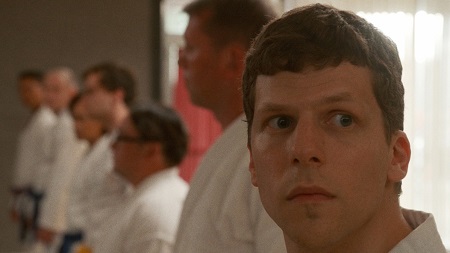
From there Stearns starts diving deep into concepts of masculinity, femininity, violence, revenge, forgiveness and identity, all of it depicted with an overtly theatrical flair that helps give things an idiosyncratic cadence that’s incredibly unique. The film is a pitch-black satire that’s as topical as it is fascinatingly character-driven, events building to a surrealistically volatile climax is hysterical, shocking, cathartic and hopeful in almost equal measure.
I had the pleasure to sit down with Stearns during his visit to the Seattle International Film Festival this past June. Here are some edited excerpts from our all-too-brief conversation:
Sara Michelle Fetters: Where did this idea come from? How did this particular story bubble up inside of your brainpan?
Riley Stearns: It’s all a cross-section of my brain. It’s like martial arts, comedy, drama, metal; everything that you want in a movie. It’s all personal experience stuff for me. It’s very, very, very loosely based on feelings and experiences and passions of mine. The fact that people have been responding to it the way that they have is somewhat surprising. It’s kind of crazy. But it’s really fun, too.
Sara Michelle Fetters: Somebody asked me to describe the film and I said it was sort of like the quirky patter of Whit Stillman crossed with the acidic wit Oscar Wilde but all of it completely on acid. Does that work?
Riley Stearns: [laughs] I’ll take it. Yeah. I’m not going to complain about that.
I like having fun with dialogue and I like having fun with characters, but not at the expense of the character. I feel like everything in the movie is real, and even as stylized and overt and literal as everything might be I don’t ever want to make fun of a character.
I feel like there’s an earnestness that you need, and I want the audience to feel like that they can root for the characters. Casey is very dear to my heart. The fact that people have been responding to him, getting the feel of him, all of that is pretty cool. The earnestness of his character is important.
Sara Michelle Fetters: That’s the thing, though, right? It’s one thing to have this arch dialogue, dialogue that feels almost theatrical in some ways. It’s another to find a way to make it feel real even when it is all so overtly theatrical in its presentation. In the writing process I imagine you’re hopefully trying to find ways to develop and explore that, but is this still something that you don’t know if you’re hitting it exactly as you want until you have the actors there working alongside with you? You don’t know if you’ve gotten it right until you hear someone speaking it aloud?
Riley Stearns: Yes and no. I feel like as I’m writing the script I am thinking about how it is going to be hyper-real, even ever-so-slightly so. But it still always has to feel relatable. I’m always thinking about that.
When the actors come on board, they take it and interpret it. The way that independent films work, you don’t always know who’s going to be in a movie. You can’t think about specific people. You offer the part to someone and they respond positively to the script but then for a variety of crazy reasons they don’t end up doing it. Then this other person ends up doing it and you hope they get it [the material] the way you get it when you wrote it. But then you show up the first day and they do something completely different than you’re thinking, and that can be okay, too. It’s just surprising, and you have to have as much trust in them as they are putting in you as the director.
Luckily with Jesse being the main character, he came on with enough time that we were able to have conversations and go through the script. That was hugely informative for both of us. It put me at ease that Casey was in safe hands.
But he still was always coming up to me wondering if he was giving me too much or too little. He would do something very grounded and I would be like, can you just put less into it? He’d wonder what I meant and I’d give him a very subdued line reading and he’d understand what I was going for. Then he would do it, and I’d be like. That was perfect, and he would look at me incredulously and be like, “Really? You like that?”
I had to assure him that it was good. That it was exactly what we needed. And he’d counter by trying to tell me that it was, “bad acting,” but that he’d do it like I wanted anyhow. That he would trust me. And I never took offense at that because it was coming from such an honest place. Jesse is just very honest, and because he trusted me he felt like he could tell me what he thought but at the same time do it the way I wanted him to. That was the main take away from working with him. He’s so talented and yet he still put all his trust in me. The movie works because we had that symbiotic relationship. I think he’s just incredible.
Sara Michelle Fetters: I think that shows in the finished product. I was told going in that this was the most Jesse Eisenberg performance that Jesse Eisenberg had ever given. I wasn’t sure what to make of that. Now I know, and I think it’s amazing.
Riley Stearns: I think I get what you’re saying. Jesse is a unique talent.
Sara Michelle Fetters: Exactly. As archly theatrical as some might consider his performance to be, there is an innate humanity, a soulfulness, to this character that’s striking. It doesn’t matter how bizarre Casey’s antics are, or how mundane some of his line delivery is. The full impact of Jesse’s overall performance is moderately staggering. There’s pathos there. A winsome lonely humanity.
Riley Stearns: That’s so nice of you to say. Thank you.
With Jesse, because I was with him all the time, every day, I knew what I was getting and I know what I needed and knew what I wanted. But then when you’re shaping a character you get to play around with things and make things feel a certain way if you need to. The funniest thing about people saying it’s Jesse doing Jesse, and some people are meaning it in a bad way, and some people mean it in a good way. It’s an interesting phenomenon.
But most people would be shocked. Jesse does not feel like this is a “Jesse” character. He was so out of his depth at times, and he would trust me to go allow him to that place that he’s even uncomfortable with. He is an actor and he wants to emote; he wants to do things. But I needed him to be very literal and so we found the balance, which I think is what led us to the humanity that you’re speaking of. He’s just so good at what he does. So even when I’m telling him to believe what he is doing, to be the character but to say it all as literally as possible, that’s easier said than done. But Jesse can do it. He can find that balance.
Sara Michelle Fetters: As to the movie itself, I feel that one of the most important keys to its success is that it seems to innately understand what it feels like to survive a traumatic event. I think that is a core element. If you have ever survived some sort of traumatic event, maybe not getting mugged and beat up as Casey does, but other types of traumatic events that each of us goes through in our daily lives, there can be this bizarre emotional disconnect between your brain and your body.
Am I reading too much into all of this?
Riley Stearns: No. Not at all. Those personal experiences are real. They are valid. They are genuine. The place I was coming from when writing this was, I do not feel like a man, I don’t feel like what society’s expectations of a man is. What does that even mean to say that? To think that? Those fears, getting into situations where you don’t know the people around you, knowing whether they’re either drunk or crazy or just plain different than you, have a higher energy, whatever it is, those are the various fears I feel like I was trying to explore.
I wrote this in 2015, but obviously this conversation has been around forever. But that was stuff that I was already just grappling with before writing the script, and it all just sort of came from was a place of total uncertainty of who I was, that I had no faith in myself. I turned the literal translation of that into the movie.
So it’s kind of like you said. Casey is surviving, but he is also just sort of there and is along for the ride no matter what that might be. He is getting exposition from the other characters, they are adding to his story, but doing so in a way where he still feels like an active participant. But he’s also just there, too, you know? He’s trying to sort these things out.
It’s a tricky thing. All of this. Making it work. Or, hopefully making it all work. I’m not a person who rewrites a lot, if ever, so the way that this script worked was just this linear thing that I was working on constantly. I don’t know how it all comes together. But at the end of the day it does. which is fun but also scary. It’s why I like writing.
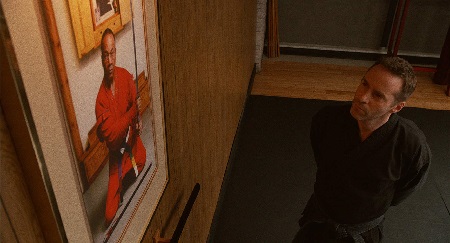
Sara Michelle Fetters: All of which brings us to maybe the perfect spot to talk about Alessandro Nivola’s character, the sensei.
Riley Stearns: Definitely.
Sara Michelle Fetters: He’s the embodiment of all the various themes we’ve been talking about. He’s also, to use a term currently in the zeitgeist, a poster child for “toxic masculinity.”
Riley Stearns: Yeah. Sensei is the embodiment of everything that we’re talking about.
Sara Michelle Fetters: And he’s so superbly portrayed by Alessandro Nivola. Yet this is also a character I can’t say I’ve ever seen him play before. Did you know he could be this terrific, this scary and also this charismatically mesmeric?
Riley Stearns: Honest answer? No. I didn’t, and that was incredibly scary. But Alessandro never flinched. So many people were f-ing afraid of this character, and we were showing it to actors and getting agents excited to show the script to their clients. But those clients, especially with the time frame that they had to not only learn the lines, but to do the choreography that they were going to have to do, and to also be in this right headspace to just jump into it all, no one seemed like they wanted to do it. They didn’t want to go out on that limb. Everyone but Alessandro. He said, “yes.”
I think that’s why I trusted him. He had this confidence. Alessandro walks on the set that first day, starts saying the lines, and I was like, this is really happening. He’s already in-character. You have no idea what that felt like. It was this huge sense of relief for everyone. He was killing it right from the start.
We still always found ways to tweak and mold, to rethink the way Sensei was going to go about doing things. Even though he’s a crazy character and he does horrible things, he comes at it from a place of intense earnestness. I think, in his mind, he’s doing what he thinks is right, that he’s not an evil person. He’s just the societal expectation of what masculinity is supposed to be.
Sara Michelle Fetters: Well, in its own way, that’s one of the many things I think this movie ends up being about, the attractiveness of toxic masculinity. The strange, uncomfortable allure of it.
Riley Stearns: Exactly. That’s definitely a piece of it. And that’s a scary thing. That terminology. Toxic masculinity. Even as new as it is it’s pretty scary.
Sara Michelle Fetters: That we celebrate many of these individuals, it is scary. And Alessandro’s performance somehow manages to walk that line of being charming and attractive yet also flat-out terrifying.
Riley Stearns: And hilarious at the same time, too. With every single bit of dialogue in the movie, the most important thing for me was everyone had to say it like they meant it. They had to believe what they were saying or it wasn’t going to come across. The comedy wasn’t going to come across. The absurdity wasn’t going to come across.
Sara Michelle Fetters: I don’t like to talk about myself or bring my own experiences into an interview like this, but in the case of this movie I find that I almost need to, if that’s all right.
Riley Stearns: Definitely. Please do.
Sara Michelle Fetters: From my personal transgender perspective, there’s so much here where I was just, “Oh my god. I’ve dealt personally with that!” Many of the things Casey finds himself struggling with, the notions of masculinity and femininity that Sensei and Anna at various points embody, it is all very similar to what I’ve had to battle in my own life. What makes a man? What makes a woman? What does the world expect from me? How am I supposed to represent myself? All of that was here, and even though Casey’s story has nothing to do with him being transgender, for me, at least, his journey translated far beyond the surface-level dynamics that are initially present.
Riley Stearns: Wow. Thank you for saying that. I can’t say any of that was inherently planned, especially considering I wrote the script from the perspective of a cis male. The perspective I presented just so happens to be my perspective, and I would never want to assume that anything that happens in the film is what a woman experiences, or assume Casey or Anna’s stories are what a transgender person experiences.
But I did hope that those experiences were human. That they would feel universal. Screening the film at all these places and festivals, it appears that has been the case. Women have come up to me and felt much of what you’re saying. Men come up to me and say the same thing. To hear that perspective from you as well? Not going to lie. That is nice to hear.
Sara Michelle Fetters: I know we have to wrap this up but I can’t let you go without talking about Imogen Poots. I’ve always loved her, but I feel like the actress has been used relatively poorly by the majority of the U.S. productions she’s appeared in. Not all of them, but quite a few, especially the bigger-budgeted Hollywood studio efforts.
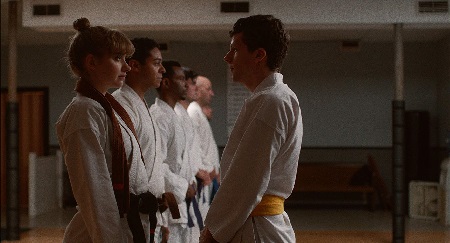
Riley Stearns: Yeah. I have to agree. But she is so great in everything that she does. Green Room blew me away. Green Room is full-on an exception to all of what you said. She is incredible in that movie and is given so much rope to do whatever she wants.
She came in to play Anna and with the little that I was able to give her, the main monologue she has, I loved everything she did. Imogen gets this one moment, and I found in the editing room I just didn’t want to cut away from her. She killed it, and she did it every single time she was up on the screen. I wanted more of her. I ended up telling her, “I wish I would have written more for you. I’m so sorry.” She brushed it all off, saying that I wrote what I needed to for the movie to work. But I still wanted more of her. She’s fantastic. I wish I could have done even more with her.
Sara Michelle Fetters: Random quick question that might be construed as something of a spoiler if people read too much into it, but do you worry that dog lovers might hate you after they watch this movie?
Riley Stearns: Hey. I’m a dog lover. I get it. I really do. But I do take those reactions with something of a moderate grain of salt. You have to do what the movie requires, and sometimes it might need things that are a little uncomfortable for some viewers to watch. I also think it is so easy to manipulate an audience with dogs. It’s possible I might have taken advantage of that.
Besides, Casey saying, “Your other left,” might be my favorite thing in the entire movie.
Sara Michelle Fetters: [laughs] Me, too, but I think we should probably leave things there so we don’t risk ruining anything for those about to watch the film.
Riley Stearns: I agree. But it’s still fun to talk about after you’ve watched it. At least, I hope it is.
Sara Michelle Fetters: Speaking of talking about the movie afterward, what do you hope audiences are thinking about and debating after they exit the theatre? What do you hope is on their minds?
Riley Stearns: That’s always a tough question.
Mainly I want people to laugh. I want people to enjoy themselves. I know it’s a very dark comedy, and some people might think it’s too dark, but I still hope most people have a good time. While I try not to read everything, I do read some reviews, and if I read a good review I then have to read a bad review, too. I had read one review where they stated they felt it was cruel, and honestly that’s a word that I would never, ever want used to describe this movie. I feel bad that that’s how that person felt.
I want audiences to leave feeling good. I feel like the movie ends on a high note. I feel like it’s a positive film. I feel like it’s about bettering yourself and I want people to leave thinking it’s okay to be who you are, that’s there is nothing wrong with that. It’s silly and it’s a little cheesy, I know, but at the end of the day I have always thought of this story as a messed-up afterschool special, just one that goes off the rails a little bit in terms of how f-ed up it becomes. But who knows? Everyone’s opinion is going to be different, and I’m okay with that. I’m very happy with what we accomplished, and I obviously hope those who see it end up feeling something similar.
– Interview reprinted courtesy of the SGN in Seattle
